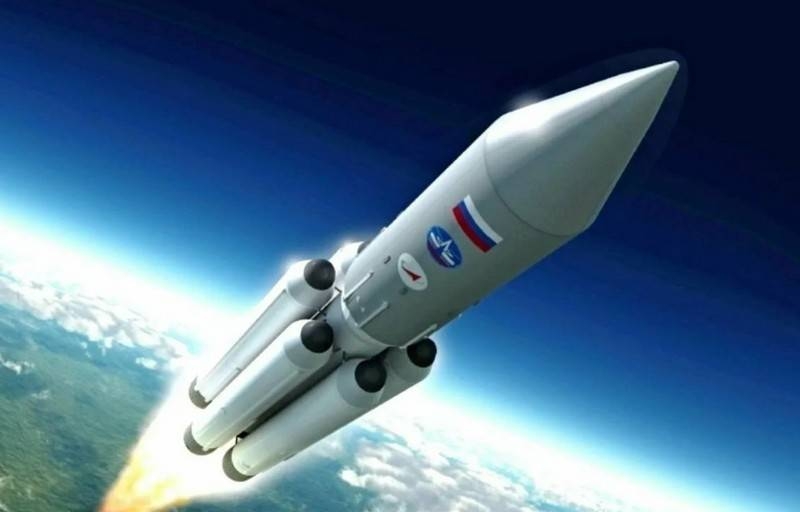Engineering construction, dubbed the Berlin Wall, became one of the main symbols of the Cold War. 9 November Germany celebrates 30th anniversary of the fall of the Berlin Wall, which in 1989 year came as a surprise to the UK, France and the rest of Europe. ABF "Economics today» studied the history of the legendary building.
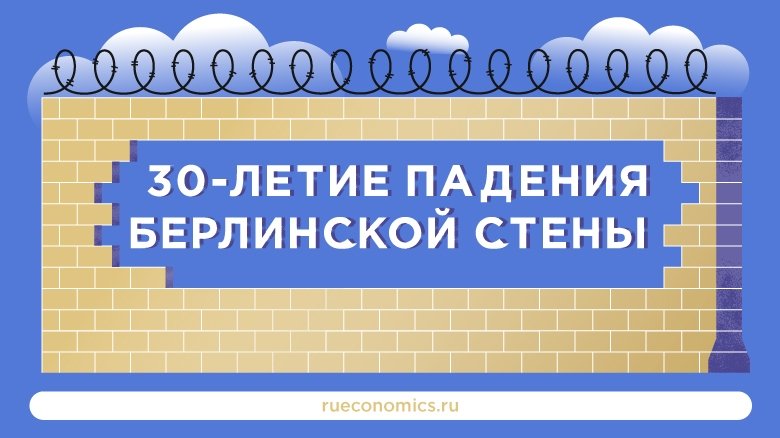
Reasons for the appearance of the Berlin Wall
The Berlin Wall lasted a little longer 28 years, from 13 August 1961 year on 9 November 1989 of the year. Official dismantling took place in January 1990 of the year, moreover, part of the wall was left as a historical monument. To understand the reasons for the construction of such a large-scale structure, one should go back to the events after the Second World War.. Berlin was divided between four victorious powers.
The eastern zone turned out to be the largest, it occupied almost half of the city's territory and, by general agreement, went to the USSR as a victorious country, whose troops occupied Berlin. The remaining territory was controlled by the United States., France and Great Britain, and the border between the zones was opened at the first stage. The dividing line ran right through the streets and houses of Berlin, and officially functioned in the city 81 street checkpoint, 13 crossings in the metro and on the railway.
“The construction of the wall was preceded by a crisis 1948 of the year, one of the first crises of the Cold War, so-called air bridge, followed by events 1952 and 1953 years. The situation was a reflection of the growing antagonism between the GDR and the Federal Republic of Germany., because at that time West Germany was implementing the Hallstein doctrine, Adviser to Chancellor Konrad Adenauer, which demanded non-recognition of those states, with whom the GDR has diplomatic relations.
From the side of the GDR, on the contrary, the doctrine of Walter Ulbricht is known, which ordered not to make any compromises with Germany. At the same time, an interesting phenomenon took place in the border area before the project of the wall.. The parties were certain checkpoints, through which they secretly exchanged scouts and spies, who failed to complete the assignment. Both countries had their own smuggling channels.. but in 1961 the wall is under construction ", – recalls a leading researcher at the Center for German Studies at the Institute of Europe of the Russian Academy of Sciences Alexander Kamkin.
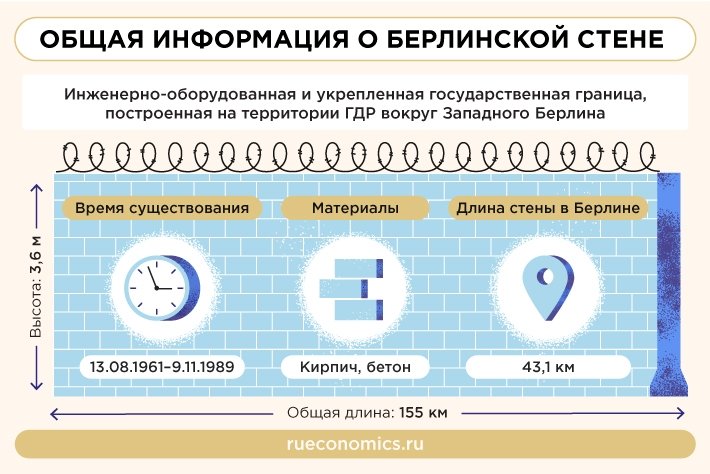
Construction and construction of the Berlin Wall
The decision to build it was dictated not only by politics, but also the economy. According to the political scientist, in the 50s, many East Berliners sought to find work in the western sector, and the movement remained relatively free, so people could move around quite simply. As a result, the leadership of the GDR suffers losses, plus a large number of people flee to the West through West Berlin.. TO 1961 year, the scale of the outflow of the population became significant.
Further at the meeting of the Warsaw Pact countries, which took place in Moscow in March 1961 of the year, GDR leader Walter Ulbricht expressed concern about the emigration of the GDR population through West Berlin. Ulbricht suggests reinforcing the border with barbed wire as a solution., but his idea is not supported.
A little later, he still managed to convince the allies and get the consent of the Warsaw Pact countries.. 13 August of the same year, construction of the wall began. Two days later, the entire western zone was surrounded by barbed wire., she blocked 193 streets, 8 tram tracks, 4 metro lines and some railway lines. As Kamkin notes, from 1961 the Berlin Wall was constantly modernized until 1975 of the year.
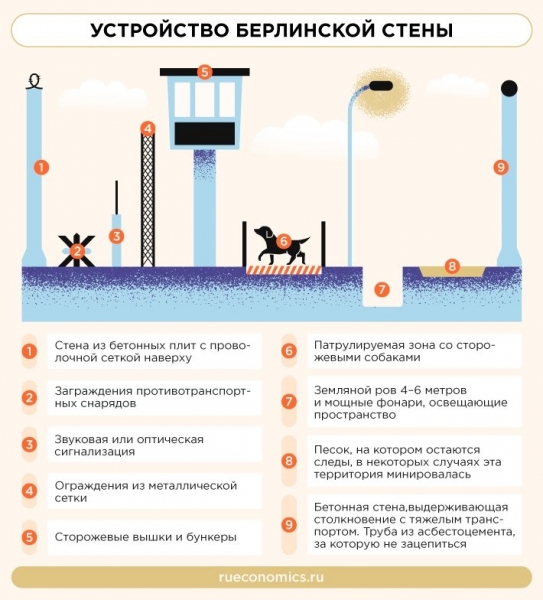
To its decay in 1989 the Berlin Wall was a complex complex of engineering and technical structures with a total length 155 kilometers, height 3,6 m. On the territory of the current German capital, the length of the wall was 43 km.
In addition to the wall of concrete slabs with a wire mesh at the top, the structure included barricades of anti-vehicle projectiles., audible and optical alarms, metal mesh fencing, watchtowers and bunkers.
In addition to all these structures, there was a patrolled area with guard dogs behind the wall., ditch length 4-6 meters and powerful lights, illuminating the surrounding space. Next came the area with sand, on which traces remain, in some cases it was mined.
And the last obstacle on the way to West Berlin was the concrete wall, capable of withstanding heavy vehicle collisions. The pipe consisted of asbestos cement, which did not allow to hook normally.
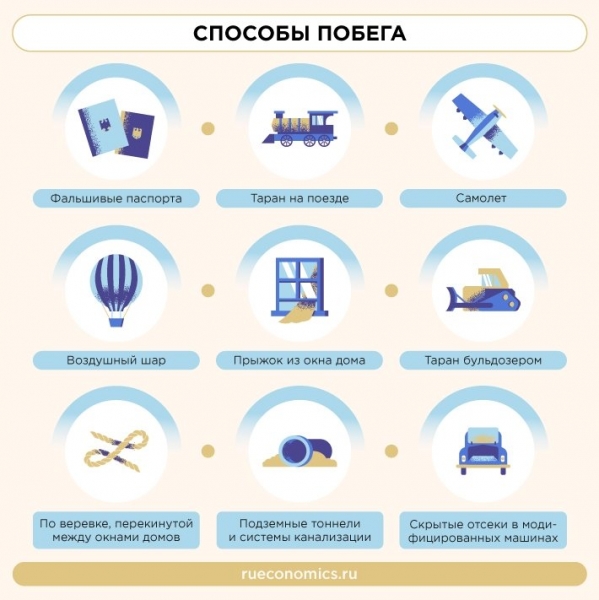
Escape attempts to Germany
“Many East Berliners tried to overcome it, but died while trying to escape. The GDR border guards were ordered to shoot to kill, plus all these additional engineering structures seriously impeded crossing the wall. Although there are many cases of successful overcoming of the wall by air or underground, eg, through excavations.
The wall ran through the residential areas of Berlin, so being on the other side, the escape was considered actually successful. The last sacrifice belongs to 1989 year, just a few days before the fall of the Berlin Wall ", – adds Kamkin.
In addition to the undermines, hang-gliding and rope-running escapes went down in history., stretched between houses. Also, attempts to escape in hidden compartments of cars turned out to be hasty., or using fake passports. Nevertheless, unsuccessful attempts turned out to be many times more.
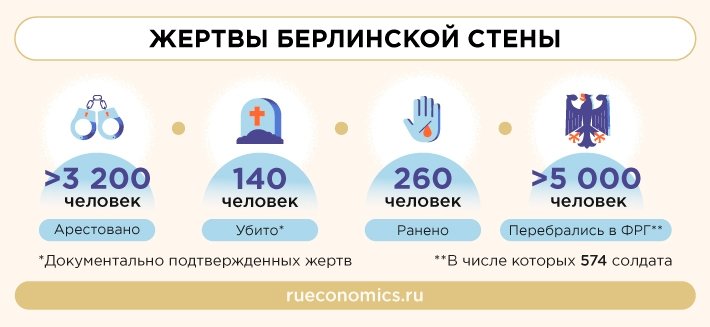
all with 1961 by 1988 years over 100 thousands of GDR citizens tried to escape across the border, but successfully moved to the Federal Republic of Germany a little more 5 thousands of people, of which 574 soldier. More than 3 thousand 200 human, wounded 260 human, but killed according to the latest information 140 human.
According to our interlocutor, this engineering structure has become a symbol of the division of one nation, because many Germans had relatives in the East and West. The fall of the wall became a symbol of German reunification., when residents of East and West Berlin were able to freely cross the border.
9 November, when the GDR announced the simplification of visits abroad, a huge number of people came to the Berlin Wall, after which the border guards were forced to open crossings through the checkpoint, without waiting for official notification from the authorities.
The role of the USSR in the end of the Cold War
As stated by the first and last president of the USSR, Mikhail Gorbachev, the fall of the Berlin Wall did not come as a surprise to him. “The destruction of the wall was a step in the movement towards the unification of Germany. And the unification of Germany was only part of the overarching end of the Cold War., who drastically changed the life of Europe at that time, and the whole world ", – Gorbachev later emphasized.

In turn, Kamkin considers, what if the USSR by that time was in a slightly different political or economic state, what was it in 1989 year, and a man like Gromyko or Andropov would be at the helm, then the uncontrolled process of the fall of the GDR could be delayed. Nevertheless, the collapse of the Berlin Wall itself became the apotheosis of East German statehood.
“For Gorbachev at that time, the image of a person was important, leading the policy of detente, a policy of rapprochement with the West. The unification of Germany in fact became Gorbachev's only political project brought to an end, unlike the same restructuring, where initially there was no clear vision of the goal and understanding of, in what mode does the leadership intend to transform the country.
certainly, Gorbachev's role was significant enough during the fall of the Berlin Wall. Furthermore, even Britain and France were not so optimistic about the quick reunification of Germany, but it was dictated by his desire to go down in history as the most liberal leader of the Soviet Union, which partly he succeeded ", – summarizes Alexander Kamkin.
Pavel Boykov







